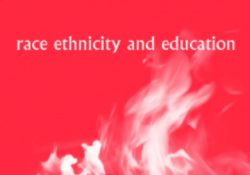eric.ed.gov har udgivet: This is the second in a series of briefs summarizing findings from the newest and most rigorous research related to racial and socioeconomic diversity in public schools. The studies on which this brief is based were published recently in three special issues of the peer-reviewed journal, “Teachers College Record,” edited by Professors Roslyn Arlin Mickelson of the University of North Carolina at Charlotte and Kathryn Borman of the University of South Florida. This brief considers the relationship between the racial and socioeconomic composition of a school and/or classroom and a variety of important educational measures. This research augments an already extensive body of work in this area, which has reached similar conclusions. However, the work published this year in “Teachers College Record” is particularly rigorous. It draws… Continue Reading →
Like this:
Like Loading...
tandfonline.com har udgivet en rapport under søgningen “Teacher Education Mathematics”: Educator perceptions of adult-student relationships, racial climate, and associated discipline techniques Link til kilde
Like this:
Like Loading...
tandfonline.com har udgivet en rapport under søgningen “Teacher Education Mathematics”: ABSTRACT ABSTRACT This special issue brings together a mix of early-career, mid, and senior scholars to critically examine current realities of, and boldly imagine future possibilities for, STEM education in the lives of racially minoritized children in the United States. Given the implicit and sometimes explicit aspirations of STEM education to be a counteracting force against racialized injustice, how do students and communities of color experience and make sense of STEM reforms/initiatives? By examining a broad range of STEM contexts including mathematics, computer science, science and environmental science education, and through a diversity of methodological approaches, this special issue aims to contribute to a scholarly conversation about how racialized power intersects with the larger themes and foci of STEM education.… Continue Reading →
Like this:
Like Loading...

tandfonline.com har udgivet en rapport under søgningen “Teacher Education Mathematics”: Abstract Abstract This paper examines historical and contemporary racializations of Asian(Americans) within the STEM system. The prevailing perception of Asian(Americans) as model minorities masks how their multiple and contradictory positionings in the STEM system perpetuate the neoliberal racial project and reproduce systems of racism and oppression. Through a multidisciplinary analysis of STEM education and industry, we demonstrate that the shifting racialization of Asian(Americans) secures advantages for White Americans by promoting meritocracy and producerism and justifies White supremacy. By serving these functions, the racialization of Asian(Americans) within the STEM system is central to the neoliberal racial project. This paper also suggests how STEM education researchers can reveal and resist, rather than veil and support, the neoliberal racial project in STEM. Link… Continue Reading →
Like this:
Like Loading...
eric.ed.gov har udgivet: This is the first in a series of three research briefs summarizing findings from the newest and most rigorous research related to racial and socioeconomic diversity in public schools. The studies on which this brief is based were published recently in three special issues of the peer-reviewed journal, “Teachers College Record,” edited by Professors Roslyn Arlin Mickelson of the University of North Carolina at Charlotte and Kathryn Borman of the University of South Florida. The weight of evidence from these studies demonstrates that racially isolated, high-poverty schools tend to negatively influence math and science course-taking patterns and achievement as measured by test scores. Meanwhile, under certain conditions, lower poverty schools and schools that do not enroll highly disproportionate shares of African American and/or Latino students tend to… Continue Reading →
Like this:
Like Loading...


